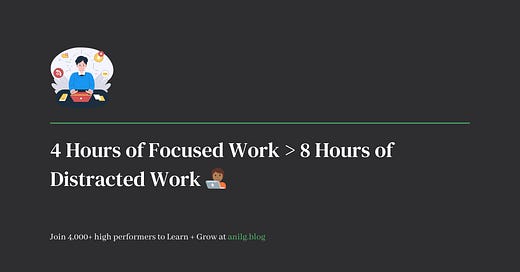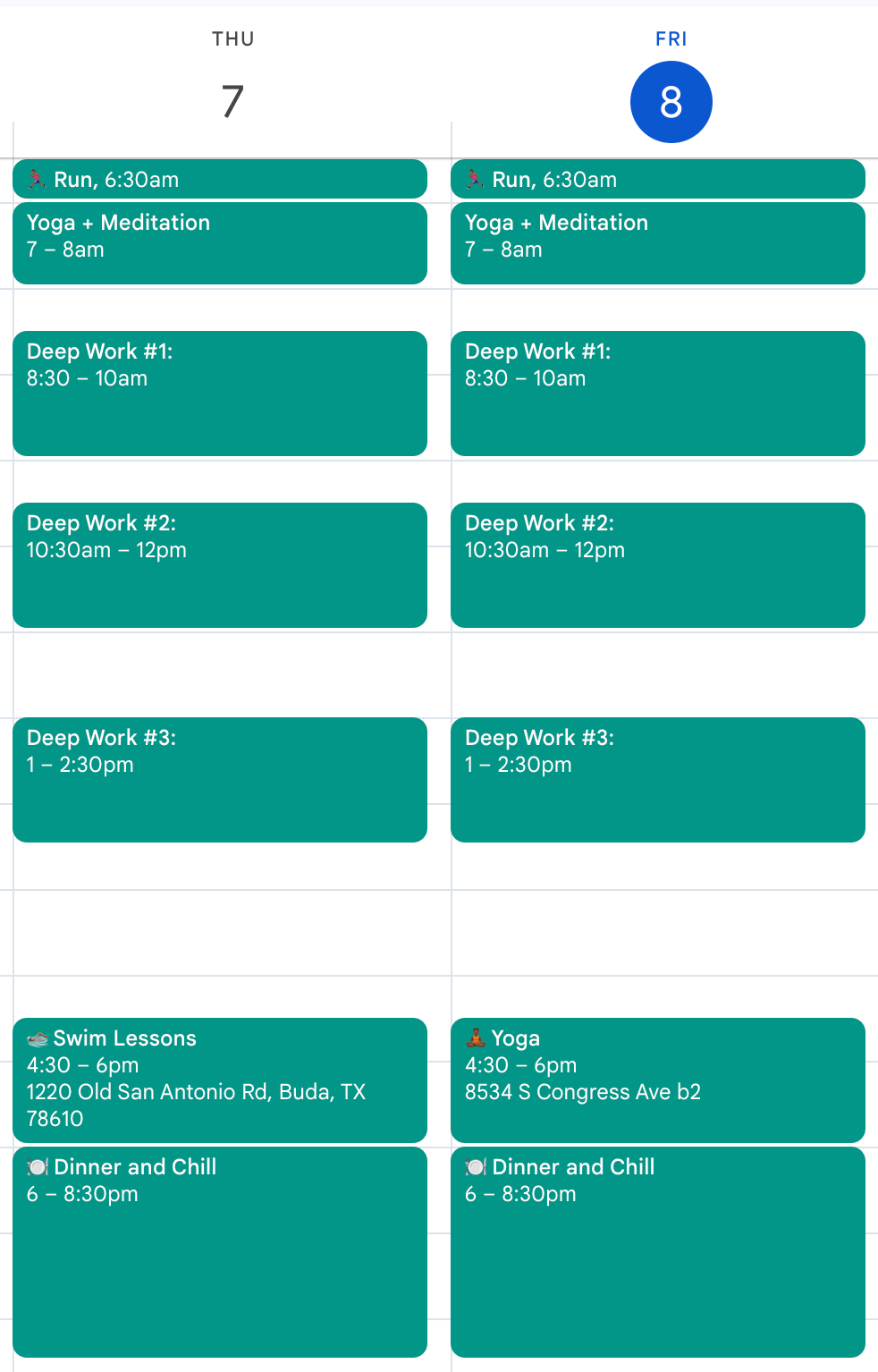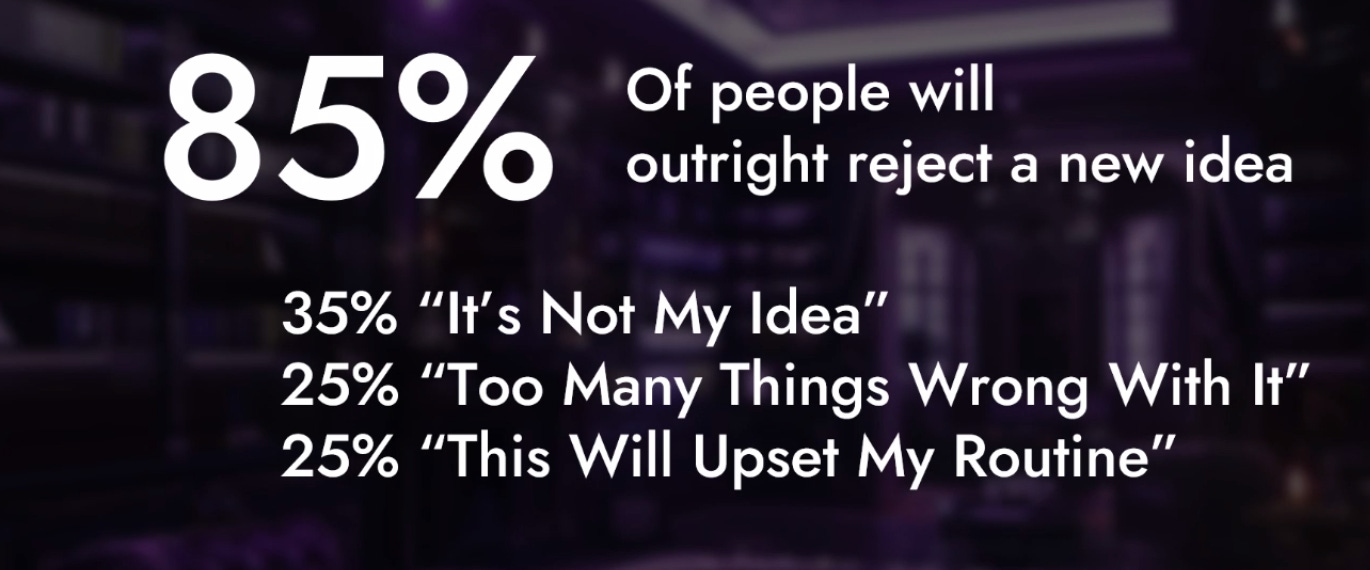4 Hours of Focused Work > 8 Hours of Distracted Work 🧑🏾💻
Issue #111: Busy ≠ Productive. Great Life Advice From Author of The Psychology of Money. 85% People will Reject Your Idea.
Happy November!
Writing this particular issue of Learn + Grow was a bit hard for me. My wife and I just welcomed our baby boy on October 25, so I’m officially on paternity leave (aka, daddy duty—yes, with all the diaper explosions included!).
I nearly skipped this week’s newsletter, but then I thought, “Why not add sleep deprivation to my list of creative constraints?” Challenge accepted! 😀
Welcome to Learn + Grow, where you will learn tips and tools that will help you be 3% more peaceful + productive in just 3 minutes a week.
💡 Here are 3-ideas to help you learn, grow, and be inspired this week!
🎓 Learn
Busy ≠ Productive
We’ve all heard it: just being busy doesn’t make us productive.
As high achievers, we sometimes take pride in those long hours. But here’s the real question: how much of that time is actually productive or making a real impact?
Or, better yet, How can we get more done in 4 focused hours than 8 distracted hours?
Today, I’m excited to share my system for deep and focused work that will help you get more done without working overtime.
Monk Mode Days
Every Thursday and Friday, I go into Monk Mode.
These are my focus days, free of meetings and distractions, where I aim for 2–3 long (60 to 90 mins), deep-work sessions. These days are reserved for tasks that need my full focus—usually big decisions, long writing sessions, creating key marketing assets, and working on big revenue-generation ideas.
I use one filter for these tasks: they have to be the ones only I should do, and they require my undivided attention.
90-Minute Small Tasks Block
Each day around 1:30 PM (after my power nap), I grab a second cup of coffee and spend 90 minutes tackling a list of small, essential tasks. I write down everything I want to accomplish in this block on a notecard or my calendar—this little ritual really makes it work. Occasionally, I even switch it up by heading to Starbucks for a change of scenery. Here are examples of what I tackle in this block:
Reply to emails
Make phone calls
Respond to Slack and Basecamp messages
Do quick research tasks
These are usually tasks that take 2–10 minutes and aren’t directly growth-oriented, but they’re necessary for maintenance.
Deep Work Sessions
On regular days, I aim for two 90-minute deep work sessions, and on Monk Mode Days, I go for 4.
Here’s my ritual for each session:
Set a clear goal or focus for each deep work session the day before.
Write down the first five steps I need to take for each session. (Very Important)
Set a 90-minute timer on my phone or use tools like RescueTime or Rize.
Prepare your body: Use the bathroom and get water or coffee.
Clear Physical Environment: Make my desk and surrounding clutter free, hide phone, remove books, wallets or any objects from the desk.
Clear Digital Environment: Close unrelated applications, Enable DND on all devices
Put on focus music with Brain.fm.
Take a 20-minute productive break in between each deep work session.
End-of-Day Planning
The success of today depends on yesterday’s planning.
At 4 PM, I spend 30 minutes planning for the next day.
Here is what I do during this planning session.
I add/update/delete tasks on my calendar starting 5am until 10pm (both work and personal).
I also update any unfinished (or new) tasks under the “Small Things List.”
I updated my two deep work sessions for the next day, along with the first 5-steps under each session.
Weekly Planning
Every Sunday, I review the past week and set up the upcoming one.
This includes:
Reviewing meetings: I create agendas, list questions, and decide which meeting is worth my time.
Updating deep work blocks for my upcoming Monk Mode Days.
Key Takeaways
A few tips for achieving 4 hours of focused work each day:
Wake up before distractions. I start at 5 AM—check out my guide on winning the day by 8 AM.
Use your calendar app religiously to plan hours, days, and weeks. My calendar is my #1 tool for staying focused on what matters.
Tools like RescueTime and Rize come with features like focus mode that not only help you stay focused but also track your progress. Highly recommend giving them a try.
Another crucial tip: write down your intentions for each deep-work session, Monk Mode day, and small task block. Setting clear intentions has made a night-and-day difference in my productivity.
Finally, I encourage you to take a close look at your calendar: is it a dollar store packed with low-value, busy work? Or is it a luxury store focused on a few high-value tasks?
🚀 Growth Tip
I love reading and collecting bits of life advice. Recently, I came across a list by Morgan Housel, author of The Psychology of Money.
Here are my three favorites:
Past performance often boosts confidence more than actual ability.
Nothing damages relationships—whether in love or work—like being overly needy.
You truly know someone well if you can predict how they’ll react under stress.
Check out the full list here: Morgan Housel’s Thoughts
🤩 Inspiration
It took me a long time to realize that when I’m passionate about a new idea or solution, I should dive in and work on it myself—not delegate it or wait for approvals.
👋 Until next time, Anil / CEO and Co-Founder of Multidots, Multicollab, and Dotstore.
FYI…I also write about agency growth and Enterprise WordPress.
May the Peaceful Growth be with you! 🪴
P.S. If you (or someone you know) is interested in sponsoring the Learn + Grow or Peaceful Growth newsletters, just reply to this email and let me know! I’ll be opening up a few sponsorship slots soon.









